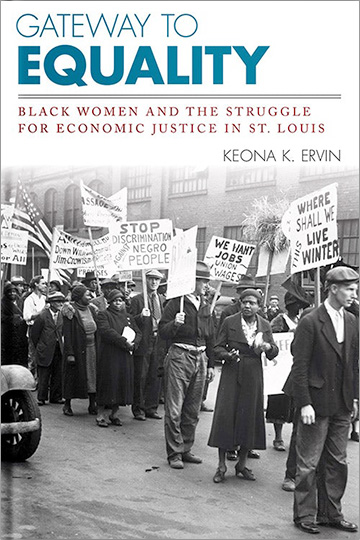
- Publisher: The University Press of Kentucky
- Available in: Hardcover, Paperback
- ISBN: 9780813177540
- Published: July 1, 2017
Like most of the nation during the 1930s, St. Louis, Missouri, was caught in the stifling grip of the Great Depression. For the next thirty years, the “Gateway City” continued to experience significant urban decline as its population swelled and the area’s industries stagnated. Over these decades, many African American citizens in the region found themselves struggling financially and fighting for access to profitable jobs and suitable working conditions. To combat ingrained racism, crippling levels of poverty, and sub-standard living conditions, black women worked together to form a community-based culture of resistance—fighting for employment, a living wage, dignity, representation, and political leadership.
Gateway to Equality investigates black working-class women’s struggle for economic justice from the rise of New Deal liberalism in the 1930s to the social upheavals of the 1960s. Author Keona K. Ervin explains that the conditions in twentieth-century St. Louis were uniquely conducive to the rise of this movement since the city’s economy was based on light industries that employed women, such as textiles and food processing. As part of the Great Migration, black women migrated to the city at a higher rate than their male counterparts, and labor and black freedom movements relied less on a charismatic, male leadership model. This made it possible for women to emerge as visible and influential leaders in both formal and informal capacities.
In this impressive study, Ervin presents a stunning account of the ways in which black working-class women creatively fused racial and economic justice. By illustrating that their politics played an important role in defining urban political agendas, her work sheds light on an unexplored aspect of community activism and illuminates the complexities of the overlapping civil rights and labor movements during the first half of the twentieth century.
Reviews
In this masterful work, Keona Ervin makes a convincing case that African American working-class women’s self-organization not only shaped black freedom movements and trade unionism but also embodied the larger possibilities for a democratic social contract for all. Gateway to Equality uses gender not only as a means of identifying the full scope of black women’s work and activism, but also as a tool for interrogating the meanings of ‘civil rights’ and ‘labor’ themselves. In accomplishing this, Ervin pushes to the next level the study of black working-class community and struggle in St. Louis, Missouri and beyond.
~Clarence Lang, author of Grassroots at the Gateway: Class Politics and Black Freedom Struggle in St. Louis, 1936–75
Gateway to Equality is an important work of historical research that not only explores black women’s paid work and working-class black women’s class experiences, but also importantly situates black women’s struggles for justice and dignity – often unpaid and always fraught, whether led by working-class or middle-class black women – as ‘labor.’
~Rhonda Y. Williams, author of Concrete Demands: The Search for Black Power in the 20th Century
An interesting, well-reasoned case for the importance of black women in the local labor movement and beyond.
~Gears of Biz
Ervin impressively combines archival research and oral histories to update the understanding of economic struggles by domestics, housewives, professionals, housing activists, and food, garment, and defense plant workers. She does so by highlighting key organizers in terms of intersectionality that united civil rights, feminist, and labor struggles in creative ways that were essentially democratic and progressive. Accessible writing brings these stories alive while keeping them in historical context.
~Choice
In this well-researched and highly theorized history of African American women’s role in claiming economic rights and justice in St. Louis from the 1930s through the 1960s, Keona Ervin presents struggle as a river of continuity and connectivity, with tributaries linking disparate events and movements. Ervin gives voice to these women and connects their experiences and struggles across four decades, documenting their agency and role in St. Louis history and the history of labor and civil rights more generally.
~Missouri Historical Review
[An] excellent monograph [that] shows the dynamic research currently being produced on black radical activism in the Ohio Valley. [It] challenges readers to reconceptualize what it meant to be a black activist, revealing the many ways previous understandings of radical activism have hidden the critical roles of understudied groups.
~Ohio Valley History
Gateway to Equality is a major contribution to African American labor historiography. Keona K. Ervin joins an impressive cohort of historians whose recent publications explore African Americans’ multifaceted labor practices and the diverse ways in which black labor impacted urban labor markets, city landscapes, and the struggle toward race, gender, and class equality. Ervin brilliantly illuminates working-class black women’s economic and political experiences, particularly their day-to-day survival strategies as well as the moments in which they engaged in political struggles to improve their lives and communities. Ervin offers an engaging study that challenges historians of the black female experience to reconceptualize ideas about race, gender, and labor. Moreover, this innovative work illuminates the voices, narratives, and experiences of a dynamic group of underrepresented urban black women mothers, workers, and political activists.
~American Historical Review